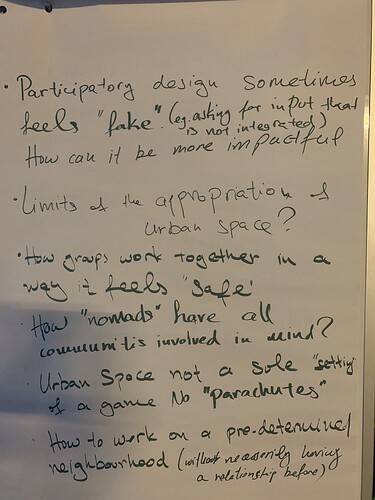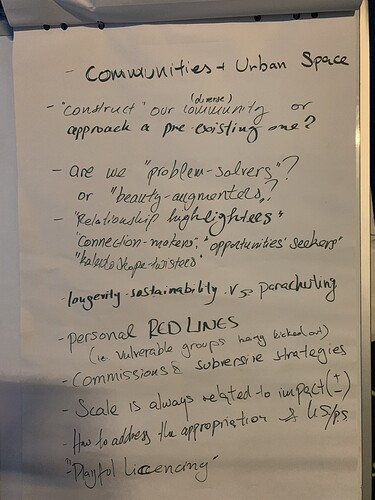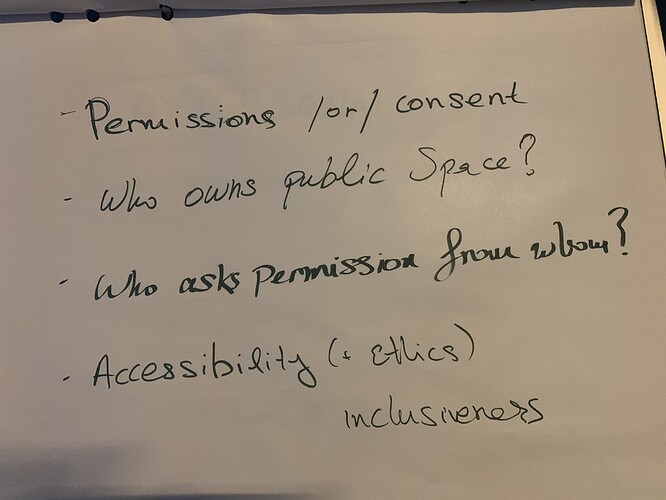The first part of the session was a collection of question about question between the participants.
The question were written by @GiorgosPapavasileiou and the session was facilitated by @LizzieH and @lilyhiggins.
-
the approach of the artist/designer/game designer coming inside the community to “solve” a problem, that sometimes is not a problem of the community, actually is a problem that maybe only the artist or the organization that is inviting them see.
-
one solution could be instead of approaching community action is looking at the beauty instead of problem
-
what is participatory design in the next two months
-
the community that we are working with (Amsterdam Branch) are more looking for the opportunities and we are the one facilitating this, connection makers.
-
do you think that design can really solve something? Also in term of languages we are using words that are mediated by business / capitalism, so they influence the relationship between communities and artist
-
what is the relation between Game designer and gentrification, sometimes are resistance strategy, you trust people that come to your neighborhood only when yo can trust them, sometimes if you are worried about loosing your home you don’t want anyone to come.
(it’s something personal that only) -
be aware that someone is inviting us to do something that maybe is not good for the people living there, we will naive thinking that we can solve and make it still work
-
there is also a relationship with scale, how big is your impact, usually it’s requested a large scale impact
-
when does it become justified or ok to even go in a community in the first place (savior / honorable native clichè), I wonder when is welcome and when it should happen, intentions are not enough.
-
in the game format there is the problem of appropriation of public space that brings a big questions about the impact that you can have on other people. Also the game is for the players alone and not all the others. Journey to the End of the Night is a game that for example test this concept and also LARP does something like that.
-
The question is also about the use of public space, sometimes there is a permission thing that precede that. In our experience we try to do that but this is more because of law then about ethical questions
-
@sebquack has done some work on playful licenses, exploration of law that are in CC that could be imported
-
another way of doing this that the game will be understandable of from outside
-
who are games serving form an urbanist perspective
-
if you are organizing something that is temporary every time you have also to consider permission, regulation will also be a weak spot for games; @MariaS remember playing a game with +50 people and asking for permission was not questionable, but asking fro the neighborood group and communities, was easy and we did that, permission is not only for the state but small.
-
asking to community is more a question of consent, because they didn’t ask for that, and a game experience is affecting them.
-
public space is a place where there is a contest, and conflict, but if you stage something is your responsability to negotiate
-
public space is the only space where we can have negotiation with people that we don’t know, and we define who we are as a community in a time where we don’t have the opportunity to have conflict to much and we usually live inside bubbles. And negotiate with people that you don’t know is usually also scary
-
who ask for permission? The players or the organizers? Who is responsible? Who is liable for the game
-
Legal responsibility and moral responsibility, maybe everything is down to this two questions.
-
Appropriation is ethically acceptable? That could be about guerrilla style of doing or other things.
-
How accessible are our games? Different abilities, different ages, different languages.
Often we create games for fully able people, my solution is parallel version of the game so that you can adapt, but it’s not something that is a red line that lead my practice.
As a final remark @lilyhiggins suggested to have a ongoing conversation that relate to the work that we are doing, maybe we can organize calls, discussion online and there is also a document about the methodology that is a commenteble version.
It would be good to have also practical example.


